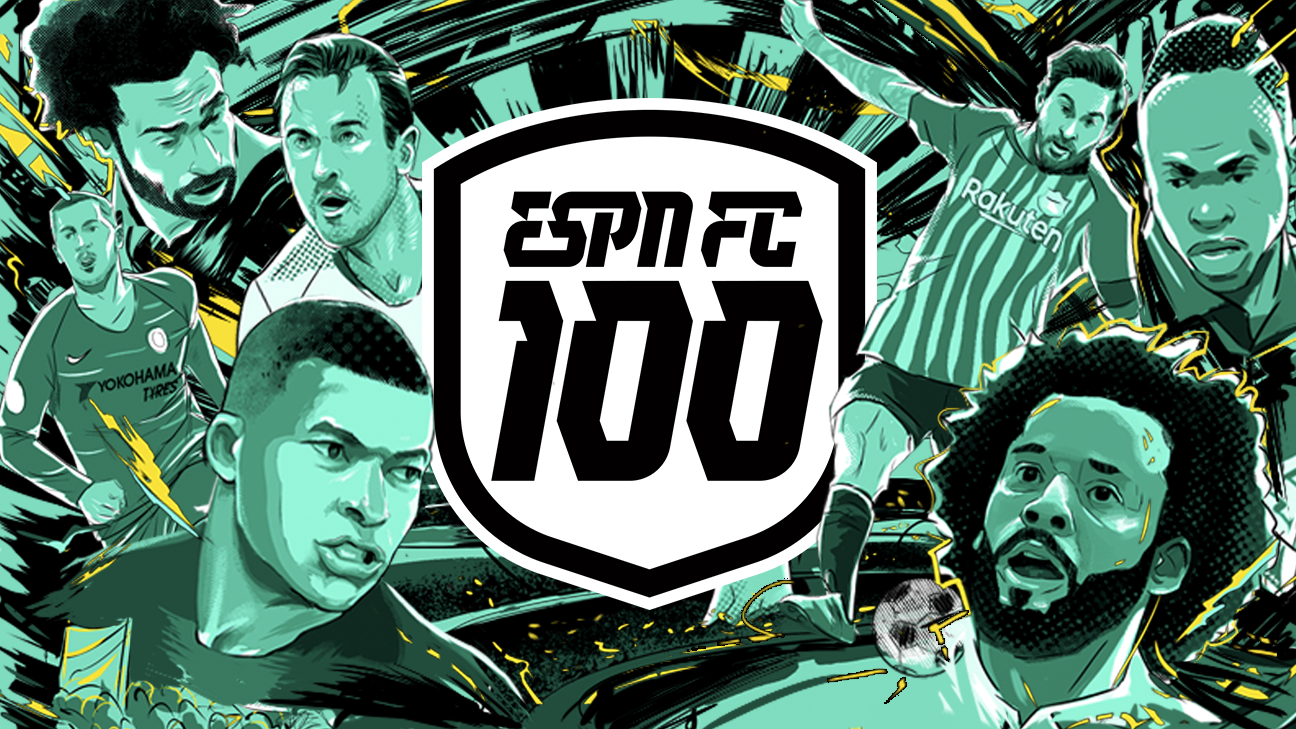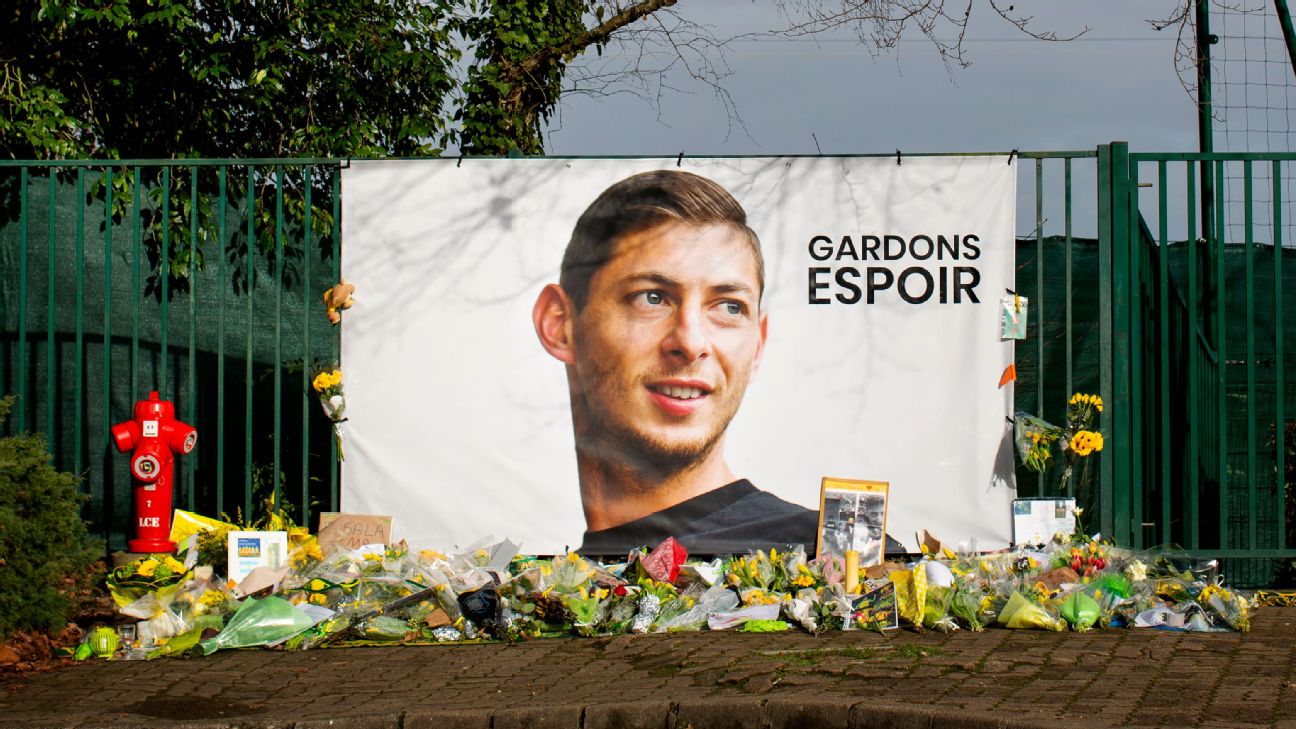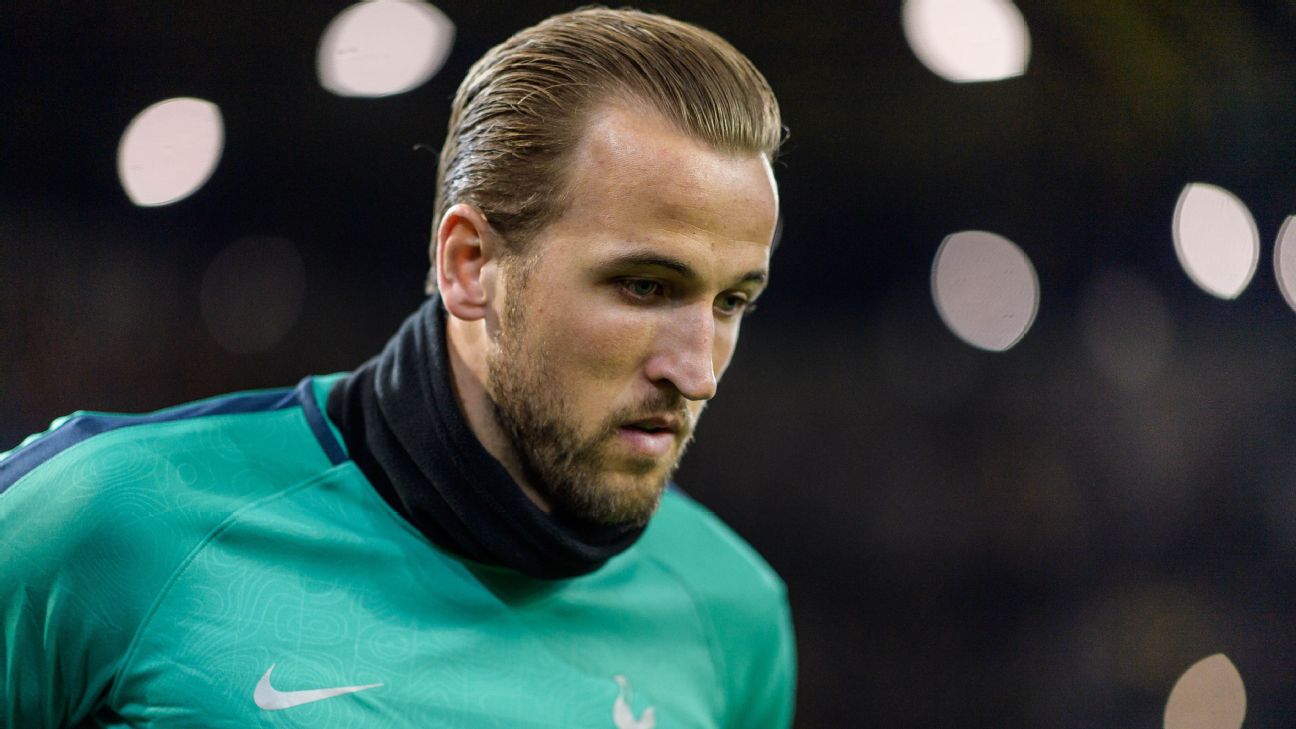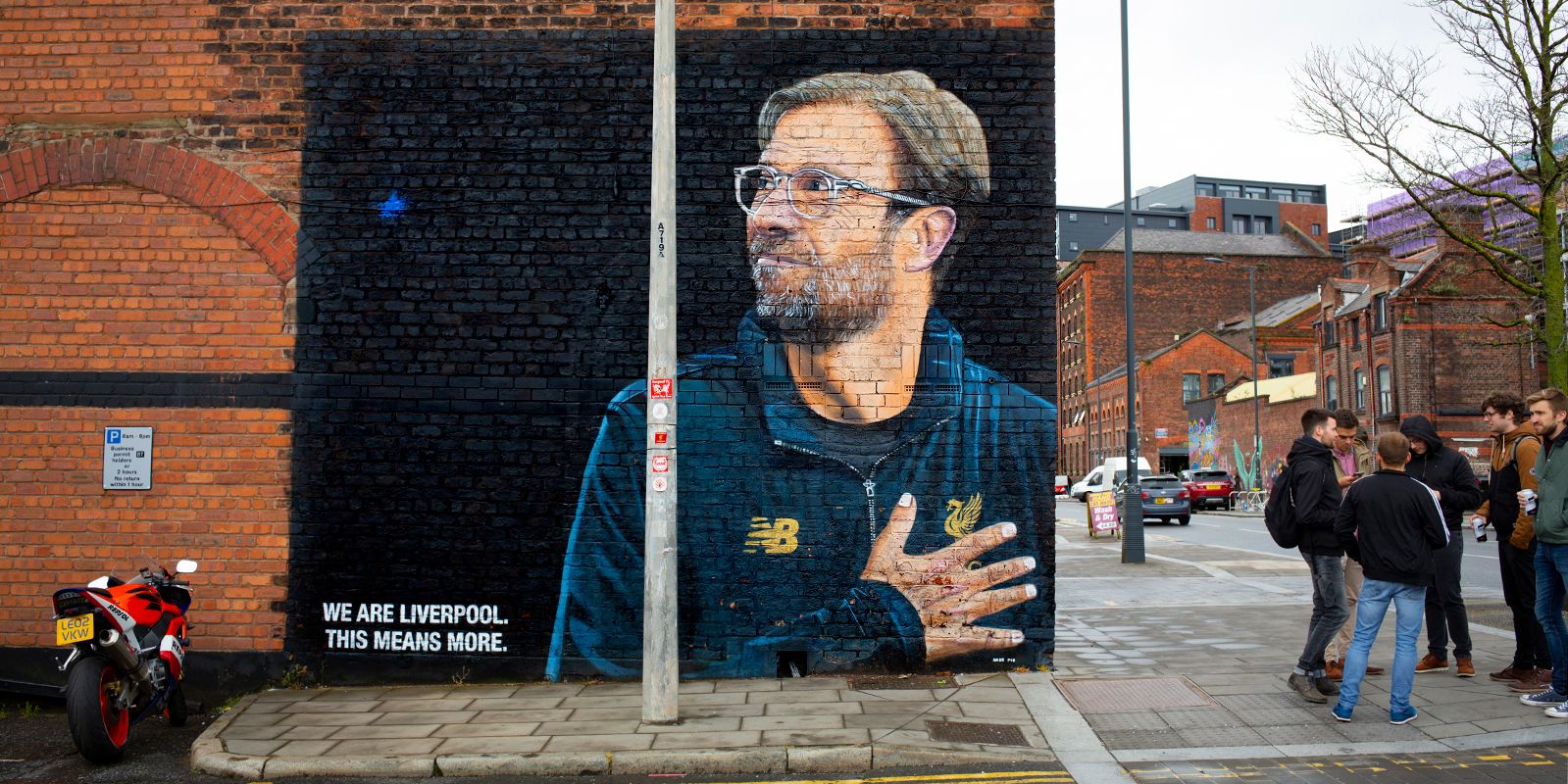
Liverpool Rising
Liverpool are in a white-knuckle race to win their first title in almost 30 years. Here's what it would mean to a city that has experienced so much joy, hope, despair and tragedy along the way.
The church organist wanted to meet outside Liverpool's Anfield Stadium. Her name is Anne Preston, and she carried the program of a funeral she'd played the day before, as a document of something both ancient and achingly current. She wanted me to see it, so I'd understand how life, death and resurrection are so tied together with football along the banks of the Mersey River.
She arrived with her husband, meeting me between the Sir Kenny Dalglish Stand and the Kop, the mighty Liverpool Kop. As he went over to sort his tickets for the first leg of the Champions League semifinal in Barcelona, she produced the program and told me about a musical request from the family. The mom made the request herself. To honor her son, whose funeral program had Anfield on the front and the club crest on the back, she wanted Anne to subtly work in "You'll Never Walk Alone" during the Mass. It's a familiar request to Anne, and to every funeral director and organist in Liverpool.
At the crematorium a half-mile up the road, the man in charge says they keep a CD on hand of Gerry and the Pacemakers' version of the song. A third of all grieving families ask for it, he says; another third ask for the Everton anthem. That's eight of every 12 funerals who want football to be part of the service.
The Liverpool anthem gets played at a lot of weddings, too. Anne and her husband's first dance was to "You'll Never Walk Alone." People want to hear it when a life begins and when one ends, and Anne understands. So yesterday, as she played the organ during Communion, she saw her chance. She slowed it down, but the familiar chords built toward the song's most famous line.
Walk on with hope in your heart and you'll never walk alone.
This is a raw, thrilling, stressful time to be following Liverpool Football Club. They are in the stretch run of a league title race with Manchester City, and if both clubs win the rest of their games, City will finish with 98 points, one more than Liverpool's 97. That would be the highest point total not to win the league, the third-highest point total ever, a gutting second place for any fan base but especially gutting to one whose team once dominated English football but haven't won the league in 29 long years.
From 1976 to 1990, Liverpool won 10 league titles, and then the Premier League was born in 1992 and the Reds haven't won since, all their history in a football world much different from the one that lives around the planet today. For years it seemed like they got left behind when insular, parochial English football got replaced by a global mega-spectacle, in the same way their dock economy got left behind, the commercial and sporting collapses speaking to and reflecting upon each other.
Last year, Liverpool made it to the Champions League final and lost. Another near miss seems too cruel to bear and too exciting not to follow. So nine days ago, I drove from London to see LFC in Cardiff, and in that week and a half, Liverpool and City have won both their league games, with City beating Burnley 1-0 on a goal that crossed the line by 1.1 inches.
That's how close this finish is going to be.
Two games remain in the league, and Liverpool play the first Champions League semifinal leg on Wednesday in Barcelona. The Reds might get a historic Double and cement their return to the top of global football, or they might walk away with nothing. That tension and hope is what I went on the road to discover, and along the way, I found a club that nearly perfectly reflects the strange city it calls home.
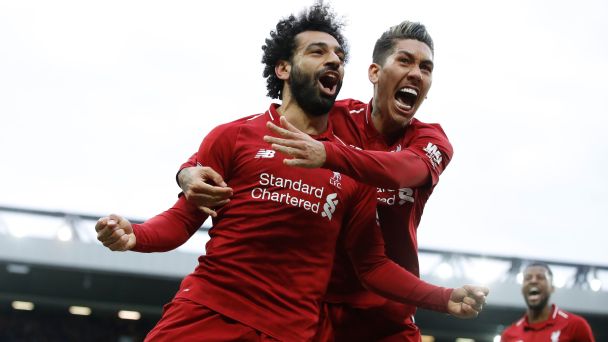
Mohamed Salah and Roberto Firmino are just two of Liverpool's superstars this season as the club now competes for top honors in England and Europe under Jurgen Klopp's watch. Martin Rickett/PA Images via Getty Images
Two Sundays ago, in the final minutes of Liverpool's 2-0 win at Cardiff, I walked to the parking lot where the buses carrying hardcore Liverpool fans waited: the "away coaches," to locals. Once Liverpudlians traveled the world in huge numbers; the six or seven remaining coaches are the carriers and protectors of that tradition. Thirty years ago, there were a lot more coaches, each from a specific neighborhood, but now just a few remain, with nicknames like Cambraco, the Urchins, Vinny's, Birkenhead Bus and the Irregulars. They are what Italians might call ultras, but really they are mostly working-class sons of working-class Liverpool postcodes like L8, whose world remains insular. Even as it globalizes, Liverpool is a place of subcultures: guitar bands and underground tech-house shows, a skateboard scene, a football scene, on and on. Liverpool is a city run by codes, old ones and new ones, too.
A sportswriter friend introduced me to someone who rides an away coach, which used to be three coaches that are now combined to one. Rising ticket prices have priced out many of the people who used to follow the team home and away. Locals have protested these price hikes, even walking out in unison three years ago, more than 10,000 exiting and singing, "You greedy bastards!" On game day, this coach makes three separate pickup stops around Liverpool. There is an invisible dividing line between the front and back that only a few riders can cross, even after 10 years traveling the country together. The guy tells me via text he'll be wearing a pink Lost Art T-shirt, from a Liverpool skate shop. The hard-core fans don't ever wear team colors or gear to the game; once a way to elude police suspicion, now it creates it but remains part of the supporter theology.
I spot him and ask how he's handling the stress of the coming weeks.
"We're gonna struggle," he says. "We're really gonna struggle."
He walks me between the coaches where there are a hundred or so fans, laughing, joking with the cops who keep close watch on them. "You would never know this was here," he says. "It's always existed on the fringes."
You can't get on a coach without an invitation, and even that is provisional. Someone invited a skateboarder to ride down to Cardiff, a rarity since those two cultures don't overlap much in Liverpool. "They both have similar intricate rules," he explains, "but they don't mix with each other."
His coach took a chance, but when the bus leadership decided on the way that the skater had gotten too familiar and cocky, they pulled over and left him on the side of the motorway. Just like that. He'd broken one of a nearly endless number of commandments, from speaking out of turn to wearing the wrong clothes. Right now the uniform is a nod toward hooligan culture of the 1980s: high-level designer clothes like Missoni, Givenchy, Dior, anything that plugs into a core working-class ethos of appropriating something not meant for them. "£600 jackets and £600 Jacob Cohen jeans," a fan tells me, laughing.
Not long ago, the Liverpool away coach uniform was technical mountain climbing apparel, which had its roots in drug dealers in cold northwest England figuring they didn't need to freeze to death slinging weed in a park. That meant a lot of North Face gear, which became fashionable. One leader at an LFC firm bought so much high-end gear that when he got a stadium ban several years ago, he actually started climbing mountains around the country, unsure of what else to do with all the stuff he'd bought.
My new friend turned to get on his bus. Around his neck he wore a gold St. Christopher's medal, the patron saint of travelers, a gift from his mother when he started traveling around Europe supporting Liverpool.
On the back she had engraved her prayer for him: "To protect you."
Gemma McGowan, 40, from Liverpool. "I've been a Liverpool fan all my life. It's like a religion, Protestant or Catholic: You can't be both, you weren't allowed in our house to support anyone else. It's just the way you're brought up here." Abbie Trayler-Smith for ESPN
Her fear, fueled by memories of grieving mothers not that different from her, is a reminder that even in a year so full of joy, the past is never far from people's minds. Nearly every person I spoke to in Liverpool invoked or evoked the Hillsborough Disaster, maybe because 2019 marks the 30th anniversary and because the long-awaited trials of the responsible men have been shadowing this magical season.
Hillsborough has been the subject of multiple court and government inquiries, endless books and documentaries, and a phalanx of gossip and misinformation. The truth of what happened, long known in Liverpool, only recently came out in black and white, irrefutable and damning, after decades of fighting by the families of the dead, the survivors and their neighbors.
On April 15, 1989, LFC played in the semifinal of the FA Cup at Hillsborough Stadium in Sheffield and 96 Liverpool supporters died. The verb "died" doesn't encapsulate the horror, terror and pain of their final moments. Ninety-six men, women and children were crushed to death on live television, as many of the police and stadium officials who created the crush looked on cruelly, more concerned with blaming the dead than helping them. The youngest of the dead was 10.
The disaster touched nearly everyone in some way. Liverpool is a big city, yes, but it's also a small town. I met up one day with Peter Hooton of the seminal Liverpool rock band The Farm, and he was in the stands that day. Another man sat with me, talking about something completely different, until he mentioned that he'd been there that day, too. We both cried as he described some angel of a woman who lived near the stadium opening her door and offering him her phone; as a mom, she knew he'd have a mom at home wondering whether her son was one of the dead. He can still remember his aunt's scream of joy when she heard his voice on the other end, and his mother's tears of relief. Survivors all tell stories of doors opening and Sheffield mothers ushering Liverpool boys into their homes to make the most important phone call of their lives: Mum, I'm alive.
Ninety-six phones didn't ring.
The investigations into this loss of life determined a series of preventable things happened. The stadium hadn't been certified by the safety board. The government, on guard against Liverpool since fan charges caused a wall to collapse and kill 39 mostly Juventus fans at Heysel Stadium in Brussels in 1985, saw them as a menace. The police funneled everyone to a smaller set of turnstiles and created a bottleneck. That forced thousands through one tunnel, dangerously steep, which led to pens 3 and 4 behind the goal. The public-address system asked the fans already in those pens to move forward to make room. The pens on either side were nearly empty, but there wasn't a way to move from one pen to another. Nobody marshaled the crowd to the left or the right, so fans entered the only tunnel in sight.
As kickoff approached and the chaos became apparent, the policeman in charge, David Duckenfield, gave the order to open the outside gates and relieve the crush outside the stadium. Sgt. Michael Goddard radioed Superintendent Roger Marshall, "Open the gates," and at 2:52 p.m., gate C swung open and fans rushed in. The layout of the stadium and the bottleneck funneled everyone toward that dangerously steep tunnel into pens 3 and 4, and the people already in those pens, especially those at the front, were crushed. The best descriptions of what happened next comes from an oral history by beloved Liverpool novelist Kevin Sampson, who was in the stadium that day himself. I read half his book, "Hillsborough Voices," and had to put it down because it got too painful.
The Liverpool fans in pens 3 and 4 describe the inhuman cruelty of the police on the pitch looking at their friends die. A fan named Peter Carney stood trapped with numb legs and his arms trapped by his side, trying to concentrate on his breathing while a man next to him literally turned blue. He shouted at the officer to open a gate and let them out and the cop ignored him. Fans tried to climb the fence and get to safety, but the chain link was angled backward to keep them in. Everyone screamed at the police to open the gates. The cops didn't move. One officer looked at a fan named Damian Kavanagh and told him to get back. All this had its roots in English class divisions and how the working class were seen as animals to be caged, not fellow citizens to be helped, a thousand years of prejudice showing its face.
Finally some fans got over the fences onto the side of the pitch. They helped others. When Kavanagh got to the gate, a cop pushed him back and said, "You f----- t--t." Kavanagh ignored him and escaped. When he got home, he found a bruise on his back in the shape of a human hand, from the crushed person behind him. A Liverpool fan who worked as a fireman in London went down on the pitch to help with first aid. The dead and dying were strewn all over the pitch. The police formed a skirmish line across the middle of the field, and most just stood around and watched as Liverpool fans and a few first responders gave CPR and ripped down advertising signs to use as makeshift stretchers. This is all on video.
Some fans who got out of the stands alive were left to die as their families watched on television. One boy named Kevin Williams called out for his "mum" as he died, and his mother, Anne Williams, became the fiercest voice in demanding accountability from the authorities. Sampson's book is dedicated to her.
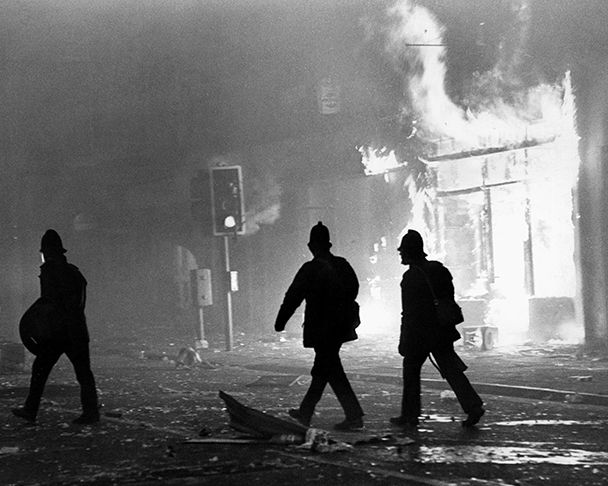
A shot of the Toxteth Riots, which ripped through a section of Liverpool in 1981. It was a notable flashpoint in the city's contentious history with authority and with the government in London following the closures of the docks. John Davidson/Liverpool Echo/MirrorpixGetty Images
The government cover-up began almost immediately and has been documented extensively. If you listen to the broadcast, the announcers said the crush happened because Liverpool fans without tickets charged a gate and broke it open. Did the police tell them that? It's a lie that was told over and over again.
From the beginning, the strategy was to blame Liverpool.
The cops questioned grieving fathers and brothers, within literal seconds of identifying the dead bodies of sons and siblings, about their prematch alcohol consumption. A cop coldly stopped a grieving man from kissing his brother goodbye, calling the body "property of the coroner."
"He's my mother's son and the property of no one!" the man shouted.
The cop refused to let him say goodbye and pushed him out. The man threw such a fit that they finally let him inside for a moment, to tell his brother goodbye, before showing him out coldly again.
The brother told the cop, "I'm coming back to see him again tomorrow, and the day after, and I'll be coming back to see him every day until we bring him back home to Liverpool. He's not your property."
The battle lines had been drawn.
One officer admitted later under oath having told what he knew to be a lie about LFC fan behavior to a high-ranking politician who he knew would brief Margaret Thatcher, the prime minister who already hated Liverpool. The story he and so many others told ended up on the front page of the national tabloid The Sun under the headline "The Truth."
It accused Liverpool fans of urinating on the first-aid staff as they tried to save lives, and of causing the entire disaster through drunken gate-crashing violence, and even of pickpocketing the dead bodies of their fellow supporters. Behavior swaths of England believed about Liverpudlians, or Scousers, as they are known. "Because of the Heysel Stadium disaster," anti-Sun activist Paul Collins says, "we weren't just a working class; we were the violent, ugly, horrible working class. Forget about the Beatles, forget about the comedians, these Scousers are a horrible lot now. Now there's 96 people dead in a stadium. We'll just blame them. They're only Scousers anyway."
The national narrative was being cemented, would have been cemented, except for the families of the 96 and the people of Liverpool who decided to fight back.
At a memorial, the president of their rival Everton, Bill Kenwright, addressed the crowd at Anfield. He said he'd seen a banner recently at a Liverpool game that said, "You've taken on the wrong city," and when he read those words, he said another thought came to mind.
"You've taken on the wrong moms, too," he said.
Decades later, the day after that fight had finally been won, a Liverpool politician addressed Parliament and described the families of the 96. "They have prevailed against all the odds," he said, his voice cracking. "They have kept their dignity in the face of terrible adversity. They could not have shown a more profound love for those they lost. They truly represent the best of what our country is about. Now it must reflect on how it came to let them down for so long."
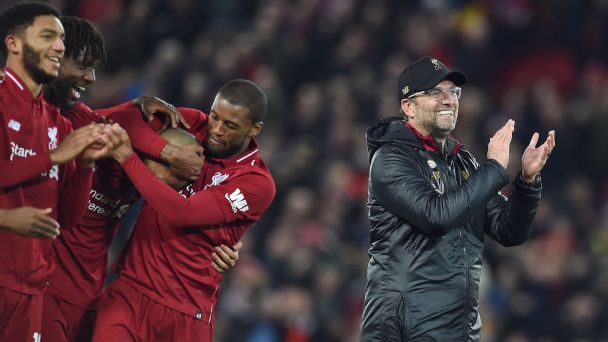
Whatever happens with the Premier League title, this will be a historic season for Liverpool in terms of points, goals scored and overall progress. The future is bright at Anfield. John Powell/Liverpool FC via Getty Images
Today it is virtually impossible to find a copy of The Sun in the city and the only ones sold are kept under the counter, out of sight, like pornography. Most newsagents post signs in the windows letting shoppers know that they don't carry the largest paper in the country. Neither LFC nor Everton will credential reporters from the tabloid. Paul Collins, the man in charge of a local group called Total Eclipse of the S*n, met me at an Italian cafe on a side street.
"You could try for the week and won't find it," he says. "You could walk around every newsagent in Liverpool and you won't see it."
I wanted Paul to explain why his hometown kept fighting for so long against much more powerful entities like the politicians, the police and the press. His answers put Hillsborough in its proper context, at the end of a horrible decade. Like many American industrial cities, the 1970s hit Liverpool hard. Its famous docks and warehouses saw less and less freight, and its workers saw less and less work. Even today, the empty warehouses that once groaned with the spoils of empire sit abandoned, with urban forests growing inside the shells and peeking through the brick walls and window frames. In 1981, the riots in a working-class neighborhood named Toxteth brought national attention to Liverpool's desperation.
"Liverpool was on its knees in the '80s," Collins says. "It was on its knees because of unemployment, strikes, the riots, everything else."
Collins and I sipped coffee and talked about the history of the city. An old lady looking for a seat asked if she could join us. He glanced at me and asked her, "What do you think of The Sun?"
"I wouldn't dirty my hands with it," she spat.
We looked over at a mural of an old black-and-white photograph on the building across from us, of young boys sitting on a fountain nearby. The fountain is still there, but Collins looks at the faces, from around 1880 he guesses, when Liverpool was a booming port, and he thinks about how all those boys are dead now, and the docks died, too, and most of those jobs, but the city remains. Its people remain, and they are the ones whose voices have long ago made the Anfield Kop into a fearsome place that shakes and rumbles and roars.
Collins is an LFC supporter, a veteran of many Kop afternoons; he traveled away to Turkey to see Liverpool win its last Champions League: the miracle of Istanbul, it's called, from down 3-0 at the half to winning on penalties. "I went to Istanbul in 2005," Collins says, "one of the most famous nights in our history obviously. We were in a place called Taksim Square, center of Istanbul. Massive, absolutely massive square. God knows how many thousands and thousands of fans. Banners everywhere, and I'm just walking and reading banners, some of them are like, poetry, and you know, speeches from General De Gaulle, and it's crazy stuff. But the one that got me was, 'Damn Scousers Again.' And it just tickled me. We were back after 20 years. Back in the peak of European competition. Damn Scousers Again."
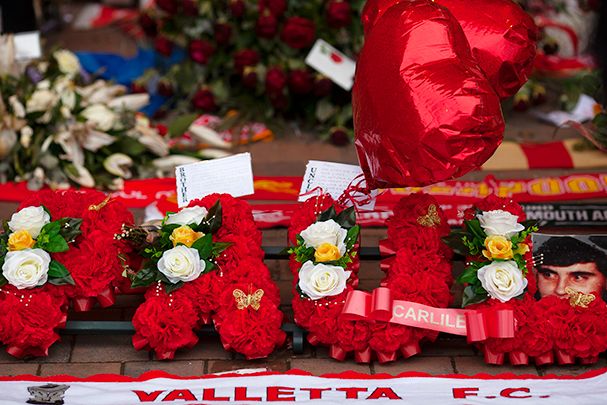
The Hillsborough memorial at Anfield, commemorating the toughest day in the club's long history. Abbie Trayler-Smith for ESPN
To be honest, that's what I thought about the next night when Man United played City: Damn Scousers Again. That Wednesday evening game put Liverpool in the odd situation of having to cheer for their biggest and most hated rivals. A United win or a draw and suddenly Liverpool would have the advantage over City in the title race. A chill had come to Liverpool and a rain fell, which left the streets around Anfield puddled and reflecting the streetlights.
I went to a pub called the Arkles within eyeshot of the stadium and found a table. The man sitting next to me, named Frank, read the local paper. He had YNWA tattooed on his right forearm. He lived nearby, like nearly everyone in the pub except me. A nursed Guinness sat on the table near the paper. Kickoff was less than an hour away.
"That's why I'm having a drink," he said. "To calm me nerves."
A couple in the corner ordered and opened a bottle of wine.
A man played darts.
A man moved around the psychedelic carpet with a manic energy.
"All the Evertonians are supporting City, and all the Reds are supporting United," he said with a laugh. "Something's not right."
Frank left to go watch at home. As ticket prices have risen, a lot of locals who once filled the Kop now build their game-day traditions around the house or pubs like this one. The couple drinking wine left 15 minutes before kickoff to watch at home, too.
"Come on, United!" the woman said to friends nearby.
United made a failed run early, and an old man wearing an LFC cap slammed his hand on the table. United almost scored 18 minutes in and someone yelled, "God f---ing hell. For f---s sake, piece of s---e."
At halftime, a young man with his girl bit his fingernails. Then City scored.
An old man exhaled hard, shook his head and said nothing.
The pub stayed quiet and when United missed an open goal, someone muttered, "Oh my God," and put their head in their hands. The person next to him covered their mouth in shock.
"Where's your heart?" someone screamed. "You haven't got any!"
"S---e!" someone said.
Then it got quiet.
Everyone slipped back out into the night, and I thought about their ancestors, the ones who came from Ireland, Scotland and Wales, and how they built a city and an empire and a spirit -- "Scouse not English," people like to say -- and whether you love LFC, or hate them, they walk through the world as their own people, which has got to be related to the crews on three centuries of ships, and the dockworkers who unloaded the raw materials and loaded the manufactured goods that built the modern world. I was thinking about the boys sitting on the fountain and about Paul Collins and how whatever inside him that makes him keep up that fight surely comes from his hometown.
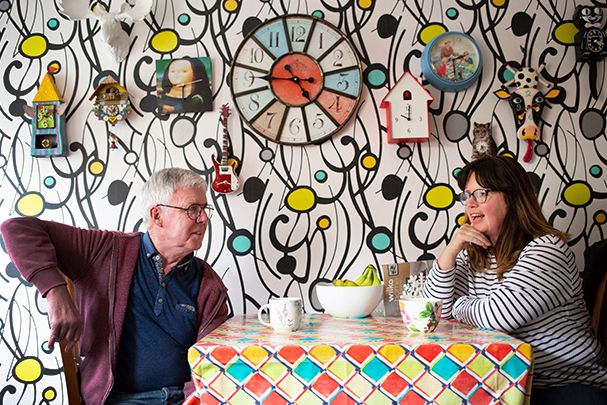
Jimmy Lawless, 70, and his daughter, Jayne. Jimmy says, "My eldest brother was a Liverpool fan and my mother made him take me, in 1955-56, and that was it. We (Jimmy and Jayne) share a season ticket 50-50 because we're poor!" Abbie Trayler-Smith for ESPN
Liverpool is full of left-wing, working-class activists with radical bookstores (that sell LFC books behind the counter, of course) and underground pubs with vintage Soviet posters on the walls. That political sense infuses the hard-core fan groups, who represent a city built on the working poor. That history is vital for any discussion of why the families of the 96 and their city decided to fight back, and why Liverpool Football Club has long been feared and respected, and to understand what this magical season means and doesn't mean.
The British Empire lived on the raw materials coming into Liverpool's port and the finished goods leaving from it. The single most valuable commodity to Liverpool's growth, however, was African slaves. Ships from Liverpool loaded up with goods popular along the West African coast, and they'd sail there to sell them all, then use that money to fill the ships with slaves, then sail to the Americas to sell the slaves and once again use that money to fill their holds with sugar, cotton and tobacco. The dreaded Middle Passage was so named because it was the middle part of a round-trip triangle to Liverpool. The average slave run made 8-10 percent return on investment, which created incredible amounts of wealth and power, according to David Paul's fascinating book "Liverpool Docks." Between 1787 and 1807, every single mayor of Liverpool was connected to the slave trade. The local Heywood family made so much slave money it founded a bank. It has changed hands and been bought and sold and acquired many times and eventually, according to the UK's national archives and the BBC, became part of Barclays. The Leyland family started a bank, too, which was also sold, swallowed and merged many times, according to a family history in the Liverpool Echo and was eventually absorbed within HSBC.
Even after slavery was outlawed, the growing British Empire and its colonies continued to make Liverpool one of the wealthiest cities in the world. Between 1820 and 1865, between 80 and 90 percent of all cotton entered Britain through Liverpool. They built so many ships here that every tree on Lord Sefton's estate was chopped down. The dock toughness touched everyone, even musicians. The famous band on the Liverpool-registered Titanic was employed by a local music company. They kept on playing as they died. That's Liverpool.
The invention of the intermodal shipping container made the port's total annual tonnage crater, because the entire ecosystem of warehouses didn't really need to exist. The longshoreman unions fought containers hard but lost those fights, over and over again as the 1970s ended. In the hot summer of 1981, with unemployment raging and Liverpool coming apart, riots broke out in the Toxteth neighborhood. In response to the riots, the national minister of the treasury urged Thatcher to abandon the city and allow it to wither from a "managed decline," as now-released public records show. Corners of London wanted Liverpool to dry up and die. To fight Thatcher, the voters elected hard-line socialist city governments between 1983 and '87, only to see the Labour Party push those officials out and replace them with ones more mainstream and palatable. The city never forgave the faraway leaders.
"Liverpool has never really looked toward London," Collins says. "It looked to America. It's looked to Ireland. You know what we say: 'Scouse not English.' And that goes back to the '80s. We used to go to Wembley to Cup finals and we would go down in the mid-'80s and they'd play 'God Save the Queen.' We used to sing 'You'll Never Walk Alone' over the national anthem. And I remember for years and years commentators would say on live television, 'This is disgraceful, these Liverpool fans,' you know, disrespecting the queen. But she's living in her gilded palace and there's people struggling to make ends meet in Liverpool and they expect us to sing the anthem."
For three centuries, the working poor of Liverpool did dangerous jobs on ships and on shore so that the investors and powerful families might become incredibly rich. They are the men and women who went to a football match at Hillsborough, where they saw the same powerful people who wanted to erase them from the earth now come for the memories of their sons and daughters. That's who decided to fight the police, politicians and press: the Liverpool working class upon whose backs an empire had been built. They couldn't go back in time to fight those injustices, but this one they could. This time they'd fight, and win, and along the way an insular city somehow become even more closely bound together.
Liverpool fans head to Anfield for their April 26 game against Huddersfield. After a goal inside the opening 15 seconds, the rampant Reds wrapped up a 5-0 win. Abbie Trayler-Smith for ESPN
I met Dave Pichilingi in his office in the cool Baltic Triangle neighborhood of Liverpool, in what was once all abandoned industrial blight. He runs a music festival called Sound City. We sat up in the loft while below a dozen or two young people put the finishing touches on the music festival, then just a week away.
A lot of fingers tapped on a lot of MacBooks. There was a Jurgen Klopp mural on the street across from his office, and coffee shops and bars and event spaces done up in plywood chic. The city has clawed its way back from the precipice. Liverpool didn't die. There was no managed decline. The Baltic Triangle is one of the most visible examples of an energy palpable all over the city: It is a vibrant, multicultural modern place that somehow manages to be tribal, too. Few other places in the world manage both those things.
"There's a skate park, and Netflix did an ad there on the wall," Pichilingi said. "And all the skater kids just f---ing covered it, about four hours after it had been put up. They said, 'Not in our f---ing city.'"
Liverpool is a global city, and LFC is a global club, which creates a natural conflict in the fan base. What belongs to the old neighborhoods and what belongs to the new world? Why can't we afford our birthright, as one father said to me? Where is the line between ours and theirs in a city that draws its cultural soul from a deep sense of otherness?
The local music scene has become a way in which that divide is bridged. The hyper-authentic BOSS Magazine started throwing watch parties and events, to give the people priced out of Anfield a space to reclaim their culture and continue to control and define it. They call them BOSS Night. Jurgen Klopp himself turned up at one of them, a nod toward understanding his new home, in the same way that the club's manager at Hillsborough, Sir Kenny Dalglish, made sure the team had a representative at every one of the 96 funerals. Dalglish himself went to many, and it was the families of the dead who pushed hard for him to receive his knighthood.
Local electrician Jamie Webster's performance of "Allez, Allez, Allez" at these BOSS Night events has become a phenomenon, the song played in Anfield now and around the world. Webster travels the world wherever the club plays, playing his song that is part hymn and part warning.
"We are loyal supporters," he sings, "and we have come from Liverpool."
One of the musicians who performs on bills with Webster and around Anfield before games, Kieran Molyneux, said he struggled for a long time with all the new people showing up to support his team. "When I first started going to the matches," he says, "I had no time for anyone who wasn't from a Liverpool postcode, and a family like me, and a background like me."
Then he realized he had three choices.
1. He could stop going. Some people did that, with one of them even starting a new football club, City of Liverpool FC, that is a repository for political ideas about working-class solidarity and aspires to be the world's first communist professional football club.
2. He could go and moan and make the experience miserable.
3. Or he could try to educate these new people about their chosen history.
He chose Option 3. Now he plays gigs at The Sandon pub a block from Anfield on game day, in the bar where LFC was founded, and he does the old songs from the terraces. People from a dozen countries stand in the audience and sing along with young men from L8 and L4 and all over Liverpool's inner city. At many big clubs with global fan bases, these kind of communal rooms are impossible.
On one of the away coaches, traditionally a white, working-class world, there is a group of Sikhs who ride every week; the old-school guys on the bus had more of a problem with them being from London than of a religion they didn't really understand. That's the civic unity wrought by Toxteth, Thatcher and Hillsborough: Anyone can be part of the tribe as long as they protect its code and respect its history. Don't bow to any man. Don't read The S*n. Don't fly the Union Jack. Be Scouse, not English. During the 29 years when the football world saw LFC in decline, it was actually binding itself together in preparation for a season just like this one.
"It's more to do with the outsider influence and that we're all Scousers, in it together," Pichilingi says. "It doesn't matter what the color of your skin is, you know, we're unified by being Scousers. I think people who choose Liverpool as their city become adopted Scousers, as well."
"Is that real?" I asked him skeptically.
"No, no, it's real!" he says forcefully. "It's absolutely real! It's absolutely real. Liverpool as a city has always seen itself an outsider. Liverpool has got more in common with New York than with British people sometimes. So there's always that sense that we look out to sea."
I ended up in a nearby pub, tucked underground in part of an abandoned warehouse, where they sold cans of Thatcher cider -- which you ordered in code, the owner told me: "Dead Lady Cider" -- a reminder of how the time might pass but a city like Liverpool never forgets. When Thatcher died, fans at the next LFC game chanted "Maggie's dead, dead, dead."
Fans unfurled banners.
"Ding, Dong, the Witch is Dead. Justice for the 96."
"You didn't care when you lied. We don't care that you died."
"You picked on the wrong city."
The pub owner's husband, a man named Tristan, talked to me about a pilgrimage he and some friends just returned from, where they walked around a lake in Switzerland -- psychedelic drugs might have been involved -- and pretended they were giving a tour of the Liverpool docks. He led the group in singing that old song "Ferry Cross the Mersey." He and his wife talked about how they loved one line in particular.
"We don't care what your name is, boy. We'll never turn you away."
Tristan smiled.
"That's crucial to Scouser," he said.
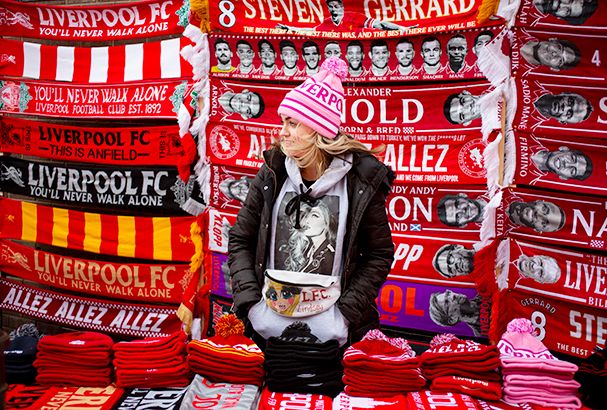
Lindsey, a scarf seller near Anfield. "I've worked on the stalls for five years; my day job is as a dental nurse. I've been a fan all my life, for 28 years. It's a family tradition, it means a lot." Abbie Trayler-Smith for ESPN
I'd never been to Anfield before, and on a windy, freezing Friday night I got to the neighborhood a few hours before kickoff. Great stadiums have their own energy -- places like Tiger Stadium in Baton Rouge, or Old Trafford up the road in Manchester, or Estadio Azteca or Melbourne Cricket Ground or Wrigley Field -- that filters into the streets around it and creates a magic bubble. A scarf for sale across the road from the gates said, "There's no noise like the Anfield noise."
Outside, vendors sold pies and chips with either curry or gravy. Inside the stadium, fans huddled together, the big grandstands acting as a wind tunnel, the temperature dropping dramatically when you came up into the bowl to find your seat. Down below in the press area, the team dished up coffee cups of hot soup.
When I entered the grandstand, the Beatles' "A Hard Day's Night" was playing.
We settled in. Hunkered down. The crowd sang "You'll Never Walk Alone," and then kept a minute of silence for a former star player, Tommy Smith, who'd recently died. The stadium fell completely quiet, with no drunken whistles, even from the away fans. Just as an Anfield noise is unlike any other, so too is an Anfield silence; the stadium knows perhaps better than any other club's how respect should be paid and a memory honored.
The game against already-relegated Huddersfield began.
Naby Keita scored the first goal in 15 seconds. Anfield roared its approval.
Over the next 89 minutes, Liverpool pressed and attacked, scoring four more goals, and playing the kind of football that, regardless of whether they win the league or not, has made this season one its fans will never forget. Jurgen Klopp, who feels like he's carrying the spirit of the club in much the same way Alex Ferguson once did for United, came out after the game smiling. He sat in front of the Liverpool press corps, with a lot of national faces now, too, and he praised the style of his opponents and of his team, too.
He reflected on the season so far.
"Ninety-one points," he said, shaking his head. "It's crazy."
He spoke about the coming two weeks, with each game mattering so much to both Liverpool and City. Either way, he is proud of how his team has played under the stress and pressure of this incredible season. In his smile and forceful belief, this all feels like the beginning of something, not another end, regardless of whether they finish second with an astonishing 97 points.
"We cannot do more than win these games," Klopp said. "If not, we did our best. You cannot ask for destiny. You have to work for it."
I left the stadium, walking around puddles and pulling my jacket tight. A rain had started to fall. Turning left out of the gate, I walked a block down to The Sandon pub, with its burgundy carpet and white crown molding. A crowd pressed together, and I ordered a Worthington pint and wandered toward the big ballroom where Kieran was playing. I heard American accents and subcontinent accents and many others I couldn't place. I heard Scouser accents, too, everyone packed into a room singing along as Kieran played the old songs, about Rafa Benitez to the tune of "La Bamba," and to the tune of "Sloop John B," an ode to the Champions League victories -- "We've won it five times, we've won it five ti-i-i-imes" -- as he hammered on his guitar and the crowd sang along.
There was joy in the room, people who were born into something and people who chose it, people who know the old codes and people who are trying to learn, and on this night, in a pub in the shadow of an empty stadium, the fragile hope and looming disappointment of the next two weeks felt as far away as a distant port.

